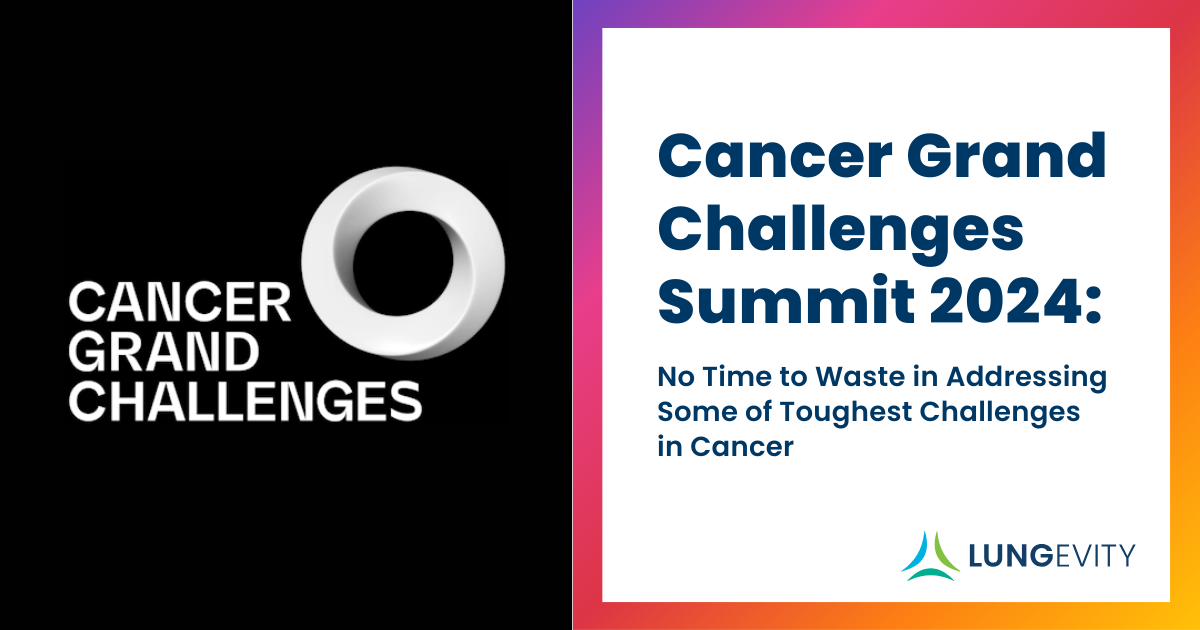Read time: 4 minutes
I just returned from the Cancer Grand Challenges Summit, held March 5–8, 2024 in London, England. Cancer Grand Challenges was launched in 2020 as a collaboration between Cancer Research UK and the National Cancer Institute in the US, whereby they provide $25 million to international, multi-institutional teams working to address some of the most perplexing issues in the cancer field.
I am LUNGevity’s representative on Team CANCAN, which is working to understand and treat cancer cachexia, the extreme loss of muscle and fat tissue (often called “wasting”) that often occurs in people with advanced cancer. It is estimated that at least 8 million people globally are affected by cachexia every year.
At least half of people with lung cancer are impacted by cachexia, and it is even more common in those with colorectal or pancreatic cancer. Our team is using a combination of approaches to study the metabolic, hormonal, immune, and neuronal (brain) pathways underlying cachexia as well as looking at host and tumor-specific factors that may contribute to its development.
We currently have two clinical studies open, one called UNCOVER and the other called LOTUS, each of which is looking to recruit 800 people with colorectal, lung, or pancreatic cancer. By collecting blood samples, analyzing physical activity, patient-reported outcomes (PROs), and looking at other clinical data, our overarching goal is to identify predictors of cancer cachexia and define patient subpopulations that may respond to tailored interventions.
Our early data from these two studies already shows that people with cachexia experience increased levels of anxiety, depression, and reduced appetite at diagnosis of their cancer or within the first three months following diagnosis. Showing there is already a window for potential intervention. Work is ongoing and we look forward to sharing more updates in the future.
New Cancer Grand Challenges Projects Announced
One of the most exciting parts of the Cancer Grand Challenges conference was the announcement of five new teams working on four different “grand challenges” in cancer, representing an investment of $125 million.
Teams KOODAC and PROTECT are working to develop novel strategies to treat solid tumors in children. Although we are making great strides in treating the “drivers” of solid tumors in adults, many of these treatments do not work the same in children, so new approaches are needed.
Team PROSPECT is working to understand why the incidence of early-onset (cancer before age 50) cancer is increasing globally, with a focus on colorectal cancer. Addressing cancer inequities and why people of color experience a greater burden of disease and worse cancer outcomes is an urgent need being tackled by Team SAMBAI.
Finally, Team MATCHMAKERS is seeking to decipher the code by which T cells receptors bind to their targets, which has implications for improving immune cell-based cancer treatments.
Project Updates from Existing Teams
We also heard scientific updates from the teams funded in previous rounds. For example, Team PROMINENT is studying what causes normal cells to turn into cancer cells, and they have shown that certain things, like air pollution, can act as “promoters” of cancer initiation in normal cells that contain existing mutations.
Team eDyNAmiC is studying the contribution of extrachromosomal DNA (ecDNA), small circles of DNA, to cancer development, as ecDNA often appears as a precursor in certain tumors like cancer of the esophagus. Team NexTGen is working to understand why CAR-T cell therapies work well in blood cancers but not in solid tumors and is working to develop novel CAR-T approaches for childhood cancers.
Some of the originally funded teams also presented on lessons they learned over the course of their multi-year projects. The IMAXT and ROSETTA teams have revolutionized spatial imaging of tumors using sophisticated technology to view tumors in three dimensions. Team PRECISION has focused on the challenge of overtreatment of ductal carcinoma in situ (DCIS) of the breast in women. Approximately 25% of breast cancer findings are DCIS, yet four out of five of these (80%) will never progress to invasive breast cancer, meaning many women experience overtreatment that can negatively impact their mental health and quality of life, not to mention having negative financial consequences.
The Cancer Grand Challenges program is also making significant investments in Future Leaders, the junior trainees (graduate students, postdocs, fellows) embedded in each of its 16 funded projects. Patient advocacy is also an important focus of the program, with teams of advocates embedded in each project and an overarching patient advocacy committee providing ongoing feedback and support to each team.
Indeed, the Cancer Grand Challenges program is an exciting initiative bringing together the world’s leading cancer experts to address some of the biggest problems in the field. Through the coordinated investment of Cancer Research UK and the National Cancer Institute, a global network of over 1,200 doctors, scientists, trainees, and patient advocates are working to deliver innovative solutions that promise to transform the face of cancer research and improve patient outcomes. I am honored to represent LUNGevity in these efforts.
If you're interested in participating in lung cancer research by filling out surveys at home, LUNGevity's Project PEER study is open for enrollment.

